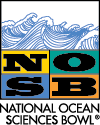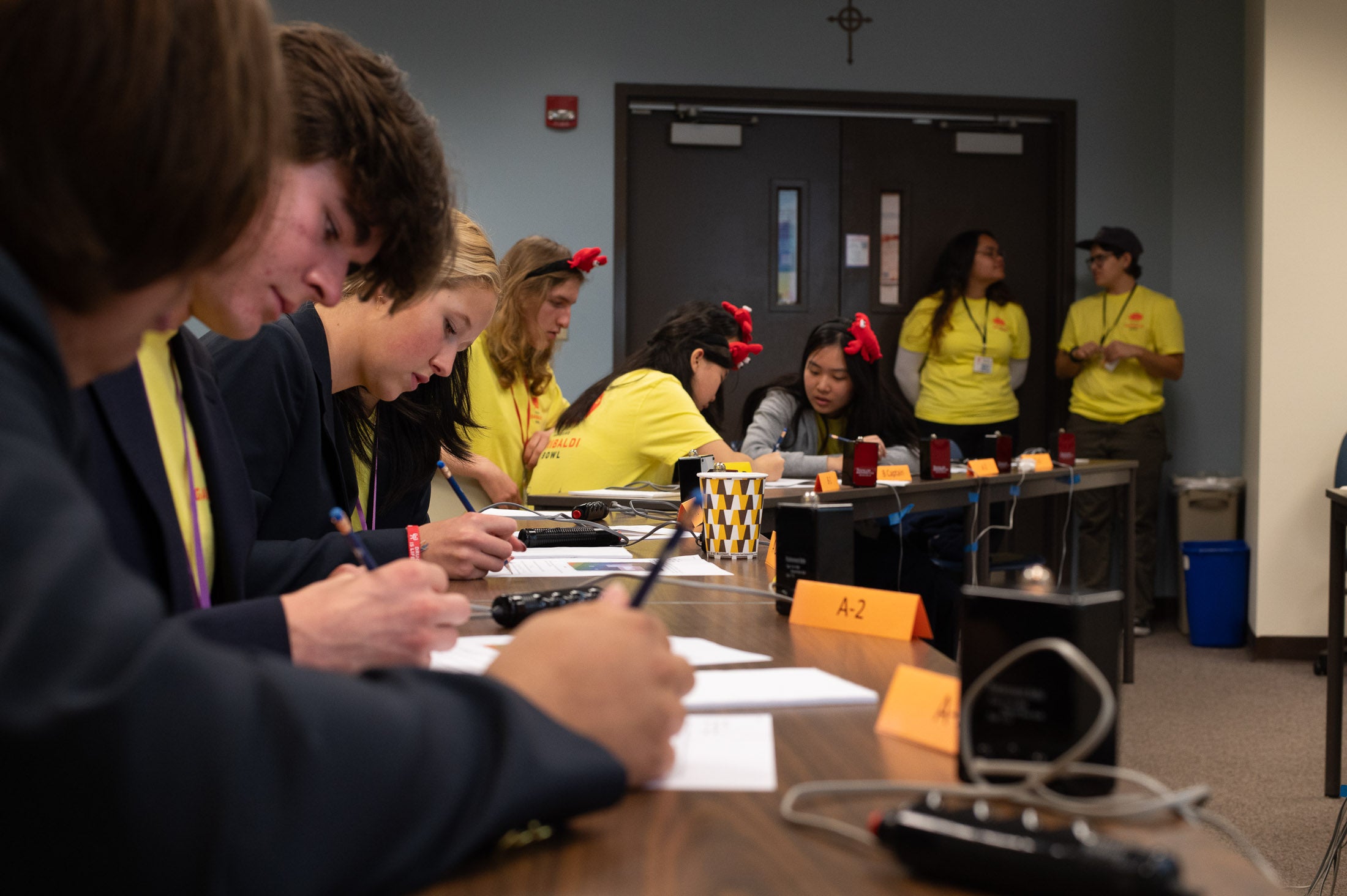Team Information
The National Ocean Sciences Bowl is a team-focused competition. Students work together to build knowledge and friendships in a fun, exciting and competitive environment.

Interested in forming a team?
Each team must consist of four to five students and a coach. All students must be currently enrolled in high school. Check out our competition map and find the region closest to you. Contact the coordinator for that region to see if they have an opening for a new team and details on the local competition. Read below for additional details and tips in forming a new team. For more information on eligibility and coaching policy, please review our rules.
Each student should be knowledgeable in all of the 4 main discipline areas (biology, chemistry, geology, and the physical properties associated with the marine/coastal environment) with some knowledge in the remaining four areas (social sciences, marine policy, geography, and technology). However, the more successful teams have students that are more specialized in different areas.
For example: Student “A” might know more about hydrothermal vents and plate tectonics (geological properties) than the rest of her/his team members. While Student “B” has a stronger background in currents and wave action (physical properties) than the rest of her/his team. This will give your team a good balance with an “expert” in each of the 4 main disciplines and 3 sub-disciplines.
It is also a good idea to have a few grade levels represented, not just seniors. By breaking up your team (3-4 junior and/or seniors and 1-2 freshmen and/or sophomores) you will still have some veterans in the current year while giving a few rookies the necessary experience to carry your team the next year. Some teachers let the students vote for team members based on knowledge, performance, and attendance. Others hold practice competitions to determine the team. It is usually up to you, so choose your team wisely. Most competitions allow non-participants to watch all the matches and to cheer their team’s achievements.
Make an agenda or study schedule during your first meeting. Your team needs to decide how many hours they will spend per week practicing. Initially, practice times may be short, but as the competition nears you may want to schedule more intensive practices. Finding the time for all the students to meet can be difficult; establishing the same day and time every week for a practice session is usually the most efficient way to handle many conflicting schedules. Decide how long your meetings will last. An hour meeting might be broken up with 30 minutes of review of the subject for the week, and 30 minutes of knowledge games.The difficulty of the practice questions is more important than the length of time spent practicing. Brainstorm on what your team thinks are good ideas for review and practice. At least2 practice competitions are recommended. This will help familiarize the students with the rapid fire, oral presentation for the questions (which is quite different from answering review questions from their text books). Keep the team enthusiastic and focused on the task at hand each week. Bring in science teachers or the school principal to act as practice moderators. Be sure the contest rules are adhered to stringently.
Example Schedule:
Week 1: Introductions/Fun meeting.
Week 2: Biology and Chemistry
Week 3: Physics andTechnology
Week 4: Marine Geology and Geography
THANKSGIVING BREAK
Week 5: Current Events, Marine Policy, and Social Sciences
Week 6: Review Rules and Strategies
Week 7: Practice Competition
WINTER BREAK
Week 8: Biology and Chemistry
Week 9: Physics and Technology
Week 10: Marine Geology and Geography
Week 11: Current Events, Marine Policy, and Social Sciences
Week 12: Review Rules, Strategies, and 7 Disciplines
Week 13: Practice Competition
Week 14: Practice Competition
Each student needs to be familiar with all 8 subjects. However, students should be concentrating the bulk of their studying/reviewing on their own 1-2 areas of expertise. When studying for the buzzer section keep in mind the oral toss-up questions must be answered in less than 5 seconds and the bonus questions must be answered in less than 20 seconds. Focus more time studying things like definitions, formulas, concepts, and short answer problems. By preparing wisely, the students will be able to spend more time practicing and learning to solve problems for the toss-up, bonus, and team challenge questions more efficiently .Take advantage of the practice buzzer and team challenge questions supplied on the NOSB website. These practice questions will help familiarize you with the type and style of questions asked throughout the competition. When preparing for the team challenge portion, look for topics in your studies that require the application of multiple concepts and mixing of science terminology with mathematics, as these are the types of questions which will be asked. Also, remind students that partial credit will be given on team challenge questions, so even if they don’t know the complete answer, writing down their thought process may gain them additional points. The worldwide web is also a good resource for great knowledge games, CD-ROMS, and interactive study tools. Another excellent study tool is to have the students write their OWN questions and then use these questions during practice competitions. Writing their own questions will help solidify important concepts.
Make sure each student knows the rules of the competition. This cannot be stressed enough. Every year there is a team that loses points because the students don’t know all the rules. Furthermore, learn how to use the rules to your advantage; strategies of the game are important. While this is an academic event it is also a competition, don’t ignore strategy preparation. Believe it or not, this could be your ace in the hole.
For example: if your team is in the lead during the second half of the game, recognize that the clock is now your ally. If you are awarded a bonus question, let the students take a few extra seconds to double check with each other to make sure they get the question right. The questions usually get more difficult as the match progresses. If you are too hasty with your decisions, the lost six bonus points could come back to haunt you in a close match.
By being well versed in the rules and knowing all the strategies of the game, your team will have the edge in a close match and may even allow them to triumph over a better team that isn’t as strategic. Your students should also be very familiar with the roles of the officials to ensure the rules of the game are enforced and the game is played fairly.
There is no substitute for hard work and this means self-discipline and practice. Make an effort to duplicate an actual competition as much as possible. Set up the room the same as an actual competition room. View a diagram of the room set-up. Also it is a good idea to rotate the person asking the questions each game. This will allow them to get experience hearing the questions come from different tones of voice, accents, and dialects. Don’t wait until the month before the Regional NOSB competition to practice the competition. Use old test questions from your previous exams or even Trivial Pursuit and Jeopardy games if you have to. Just get them familiar answering the questions orally and waiting to be recognized before answering.
There can be only one winner of the NOSB Finals competition, but participation itself is important. Involve the students in the establishment of realistic goals for the team in this competition year. Celebrate and document these goals in posters and team practice sessions.
Also make students aware of the opportunities available through the NOSB program that recognize individual achievement such as the National Ocean Scholar Program.
Don’t lose sight of the overall focus of getting your kids interested and excited about science and math. Finding the right combination of fun games and interesting study tools could take a little work. Just remember,the more students enjoy it, the more they will want to participate, and the more successful they will become. Given the proper motivation, preparation, and encouragement, your team will have a successful and rewarding science bowl experience. You can then channel your NOSB Club’s enthusiasm and momentum to do other fun things throughout the year. For example: the National Science Bowl, the National Science Olympiad program, Math Counts, Odyssey of the Mind, or the Destination ImagiNation program.
Make sure the principal, teachers and administrative staff at your school knows that the NOSB Club is an active program and that you are the person in charge. To maintain the longevity of the team over time, it can be helpful to have and train an assistant coach.
Find out about your school’s policy regarding use of the school facilities and equipment. Do they allow the use of shop facilities, computer lab, etc…?
The lock-out buzzer system used in the NOSB competitions is the Challenger I, 8 Player System with Showtime Handgrip responders. You can either rent or purchase this system from ZeeCraft. The official clocks used in the competition can also be purchased from their website, www.Zeecraft.com. If you are working with a tight budget ask your NOSB Regional Coordinator if their lock-out buzzer systems are available for practice. Another option is to ask your school if there are their clubs that use comparable buzzer systems and if you can borrow their equipment.


